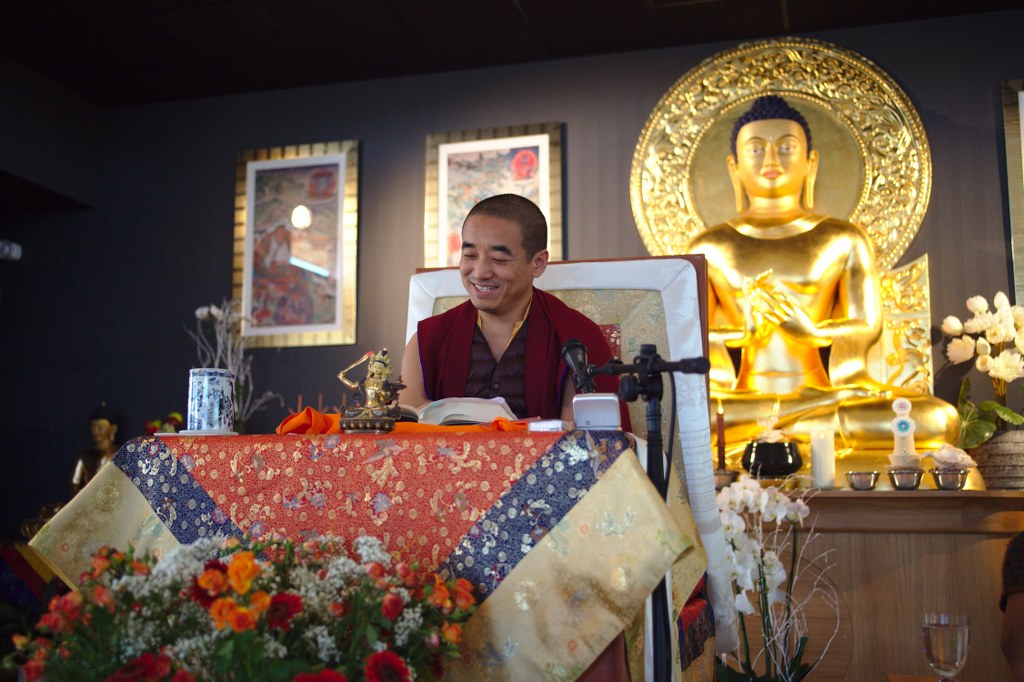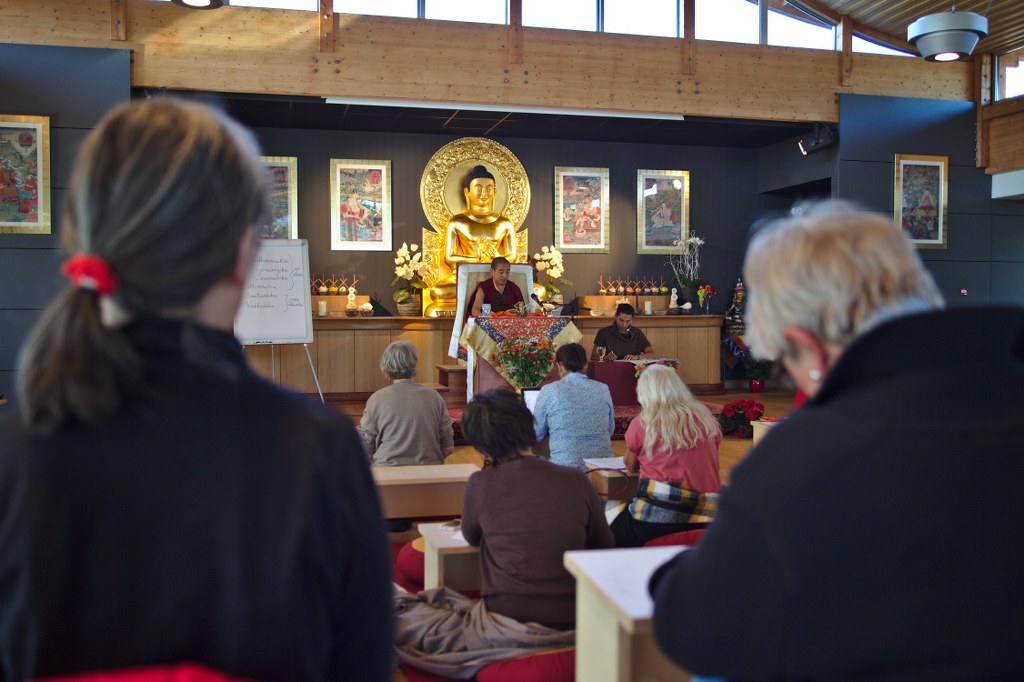Wise words of advice from Shabdrung Rinpoche
Madhyamika, study and daily life

It is not straightforward to sum up in a short column a teaching on one of the founding texts of the Middle Way – “Introduction to the Middle Way” by Chandrakirti. All the more so as at the point we have reached in this text, Dongsung Shabdrung Rinpoche is describing the different versions of the controversy between the tenants of two philosophical Buddhist views: the Middle Way (Madhyamika) and those of the “mind-only” school (chittamatra). Nonetheless, in introducing the sessions, Rinpoche often gave wise and useful advice on ways to approach the Dharma. Here is a sampling:
Doubts, study and meditation
“I realized that when people listen or study the teachings, everything seems clear to them, but when they start putting meditation into practice, doubts set in. For those who practice Buddhism, there are two phases: study on the one hand and meditation on the other. When you study, don’t hesitate to bring to the surface all your questions and doubts, and don’t let them contaminate your meditation. Don’t keep doubts and questions for meditation time when they will interfere in meditative practice and prevent you from obtaining results. It is important to gather our questions during study time in order to clarify our doubts. This is how you will be able to practice meditation in a relaxed, clear and precise way.”
Honesty, intelligence and joy
Rinpoche cited Aryadeva to explain what study entails: “To study the Buddha’s teachings, three qualities are required: honesty, intelligence and the aspiration to understand the meaning. These three qualities are effective and help us to integrate the teachings. Often when we study, we are not truly honest. We have constructed an identity with clear borders that define us and we maintain all sorts of concepts about ourselves. So long as the teachings validate our borders, we accept them. If we try to approach the teachings with our references – I am a human being, I am a practitioner, I am this or that – our understanding will be distorted.” Then, he employs a phrasing that obliges self-questioning: “if we want to be honest, we have to set aside who we are and the beliefs we have about ourselves. Cultivating very clear-cut ideas distorts the understanding of Dharma. We have to search for reality without preconceiving it.” He goes on to add: “We must use our intelligence and cultivate the joy of studying to understand the meaning. If we force ourselves, the mind won’t work as well. We can force ourselves to study, but we will tire more quickly.”
Buddha, progress and listeners
Several philosophical schools bring out the richness of Buddha’s teachings: sometimes they might seem to contradict each other as if the Buddha himself were searching for the nature of reality through his teachings. Here is Shabdrung Rinpoche’s take on the matter: “Each school of thought is a stage that enables us to come closer to ultimate reality. The Buddha taught these different schools according to the capacities of listeners. Some think that the progression in the three turnings of the wheel of Dharma reflect the Buddha’s ever-deeper intelligence as if he himself had progressively discovered the aspects of the teachings as they were transmitted. But this is not the case. As soon as the Buddha became enlightened, everything was there. He then taught according to the capacities of his listeners. It is not as if the Buddha were adding elements discovered over time. He addressed different practitioners according to their capacity and he gave appropriate teachings to each according to the circumstances.”
Emptiness, suffering and daily life
“We can understand the benefits of studying emptiness for meditation, but what is the benefit in daily life? I’m not sure that it helps to build something in everyday life, but it will help to deconstruct some aspects of ordinary life, and in particular suffering.
No one is spared from unhappiness. It is the understanding of emptiness that will help to dissipate this suffering. From a Buddhist standpoint, the understanding of emptiness is the essential remedy to our problems. It doesn’t only assuage our difficulties, it enables us to eradicate the very root of dissatisfaction. If we understand emptiness and apply this understanding to our life, this will help us to pacify suffering and the causes of suffering. But in terms of comfort and our lifestyle, we cannot guarantee anything because reflecting on emptiness can also be uncomfortable sometimes.”

My hope is this small mosaic of advice will inspire each and every one in their practice, whether it be through study, meditation or activity. I cannot help myself from observing that from course to course and teacher to teacher, these multifaceted instructions lead us upon a same path of liberation.
Puntso, Head of Dhagpo’s Programme



